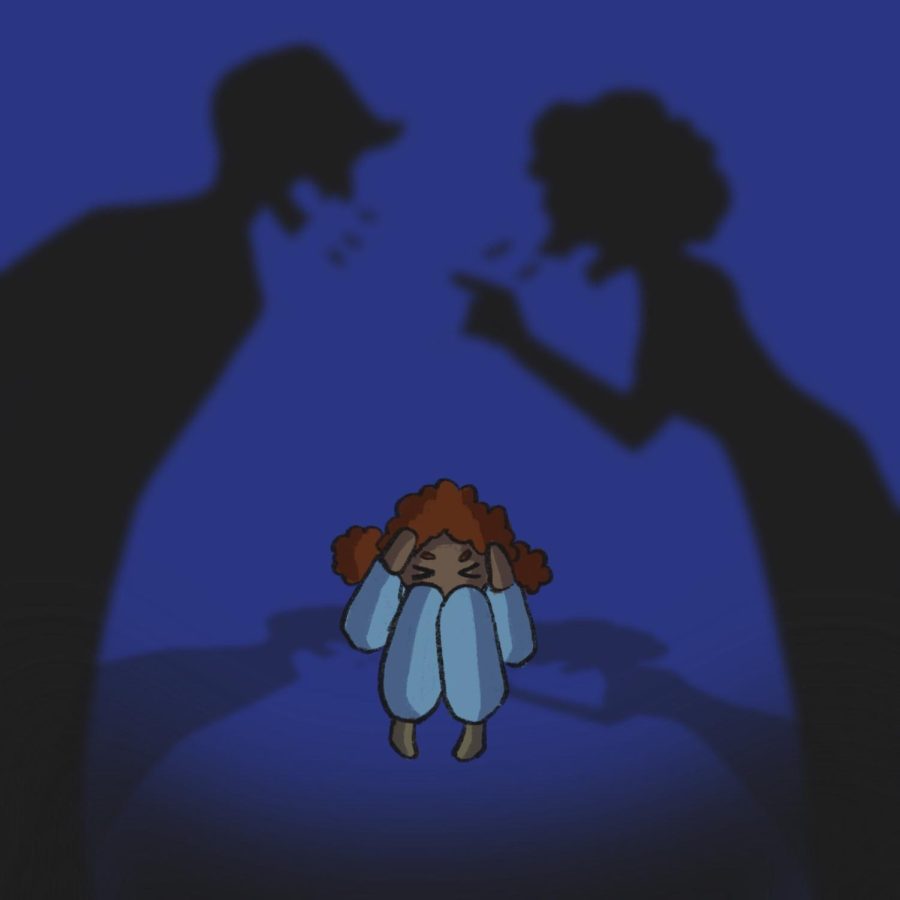Children of Divorce
October 6, 2022
Divorce is an intimidating word for most. It is adorned with an immediate negative connotation, a dark gray storm cloud raining down on the letters and lighting striking behind it. Some cannot imagine their parents divorcing; some do not know anything different. As teenagers, our brains are still developing, our perspectives still changing and evolving. We need stability at home to rely on for advice and questions. However, with divorced parents, home can become a complicated word with different meanings and many emotions.
Divorces put stress on everybody involved. There is no way to clearly state who feels worse effects between the parents and the children, as it is a very individual experience, but there is no denying the fact that children feel the repercussions, and they feel them intensely. A study by the National Library of Medicine’s National Center for Biotechnology Information (NCBI) addresses that “[some] see divorce or separation as relatively innocuous, even a positive change, especially for women in unhappy marriages or children exposed to high conflict.” Senior Jade Wimberly believes that divorces usually “would be better for the kids… the kids just want to see [their parents] happy.” It is safe to say that this statement would be relatively agreed upon. No child would want to see their parents in a marriage that is unhealthy and full of fighting. However, drastic changes from living with both parents to having to switch houses to see one or the other can be a huge detriment to a kid’s mental health. As written in an article by Mediate, “New living arrangements cause a lot of stress and confusion… Teenagers usually understand what’s happening, and their most common reaction is anger…. If parents divorced while their kids were little, the effects [of the divorce] could last even when they are teenagers.” Many children do not know how to handle such a drastic event at a young age, and it is common to see them deflecting their reactions until eventually, it overflows, leading to anger and issues relating to behavior and mental health. Behavioral issues are easily seen as responses to divorce as well, and LegalJobs states that “growing up with divorced parents means that [the children] are four times more likely to experience problems with their friends and peers than children whose parents are still together.” Overall, while divorces are stressful for every party, it is fair to say that children feel the effects the most, more than their parents, or they themselves, even know.
According to an article written by verywellfamily.com, “Children of divorced parents experience increased psychological problems. Studies have also found depression and anxiety rates are higher in children from divorced parents…. Adolescents with divorced parents are more likely to engage in risky behavior, such as substance use and early sexual activity.” Not only are there negative effects of divorce on mental health, but there are also connections to unhealthy behaviors in response to what is going on at home. Freshman Dylan Kim brings up an important point: “My friends with divorced parents seem to be okay on the surface. They can adapt quicker than other kids… but they are probably hurting inside more than you can see.” It can be difficult to find ways to cope with the emotions felt by one while experiencing a divorce. Junior Malaya Nonog Ignacio provides an insightful perspective, and when asked if the age of the children directly affects how they can react to a divorce, she says, “I do think it depends on the child, and the way that person operates, but from a personal standpoint I do think that with youth comes not knowing all the bad things, and with time comes an understanding of all the bad things, but also an understanding on how to better cope with them.” When we are young, it is intimidating to think of handling and coping with the many feelings that can be brought about by many different aspects of our lives. Reactions to a parent’s divorce are personal feelings that are most often different compared to another child of divorce. One child may have had a hard time and their parents could have had a very messy divorce; the next child could be absolutely unfazed and overall happier with the change. With this in mind, it is challenging for children to find someone to talk to about what they are feeling. Not every parent is open to providing children with therapy. If kids attempt to talk to those around them with divorced parents, they could feel as though they are overreacting or underreacting depending on what they hear from other people. While it is possible for children to talk to their parents about it, that is much easier said than done, considering many kids do not want their parents to feel guilty or worry about them due to their decision to get a divorce. With these different perspectives and possible responses in mind, it is easy for children to feel lost and disconnected while going through a parental separation.
While it can be difficult, it is not impossible by any means to have a smooth divorce. Sophomore Ian Kim emphasizes the importance of communication between the child and the parents, and says that “the parents must talk to the kid. Involving the kids in the conversation [of splitting time] is essential.” Co-parenting can be very daunting for parents, especially when it comes to splitting custody and holidays. This can be one of the most stressful parts of a divorce. If both parents are in the right space to be taking care of the child, with no troubling behaviors inside the household — for example, substance abuse or forcing the child into the middle of an argument between the parents — it can still be very hard to find the best way to divide time between houses. There are many different ways to approach the idea of co-parenting: Wimberly says that it is important to have split time if safe and if possible, stating that this split time gives the kids the opportunity to connect with both of their parents. Nonog Ignacio hopes that “the parents do their best to set consistent standards, rules, and expectations for the kids within both households, so that [the children] do not have to deal with too much fluctuating within their lifestyles when traveling between parents.” There are many different approaches parents can take when it comes to co-parenting and finding ways to make the divorce as smooth as possible for the children. While the emotional reactions kids have due to divorcing cannot be controlled by the parents, it is crucial for the parents to do their best in creating as stress-free of a process for co-parenting as possible.
It would be a lie to say that divorce is an easy experience to go through. Despite the fact that getting a divorce is most often the better option than suffering through an unhappy relationship, confusion, anger, and strife are inevitable. Emotions, routine, and lifestyle are all thrown off center, and there is even a chance for drastic behavioral changes and declines in mental health. However, when it comes down to it, one of the most vital focuses of a divorce should be on eliminating as much hurt as possible for the children.



